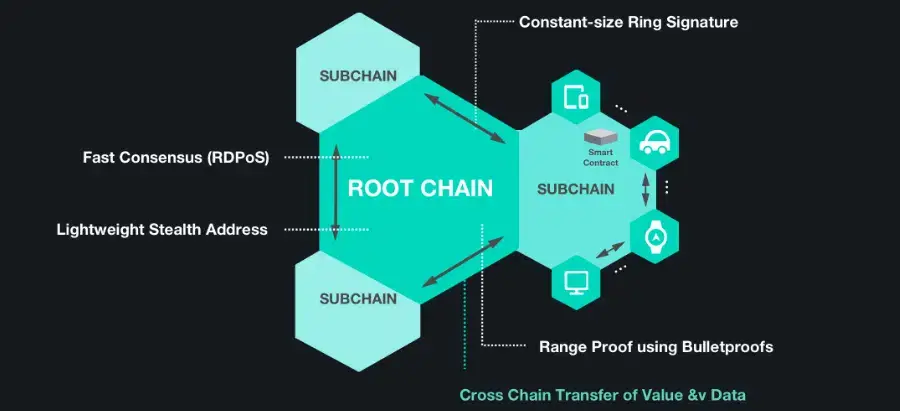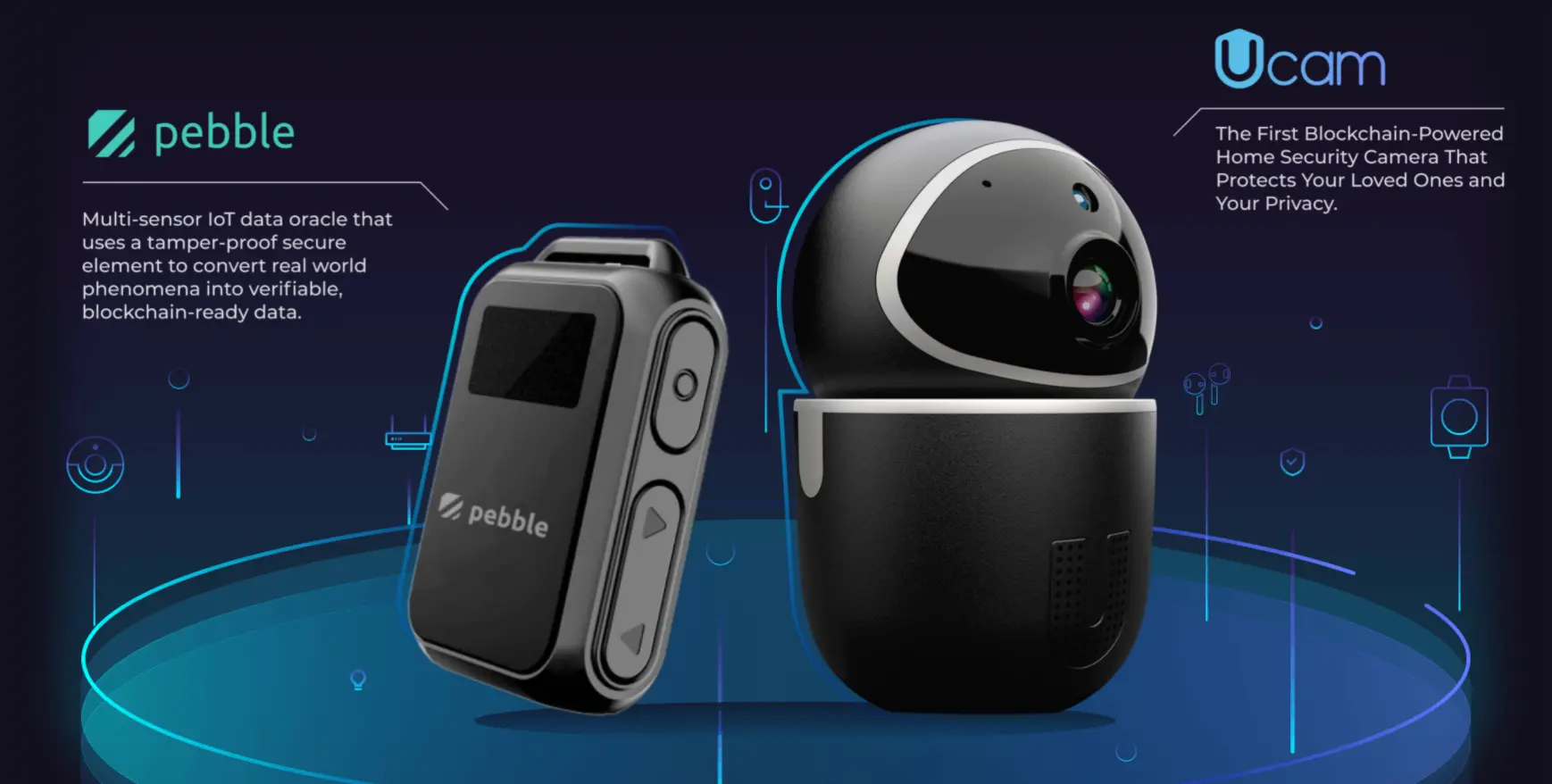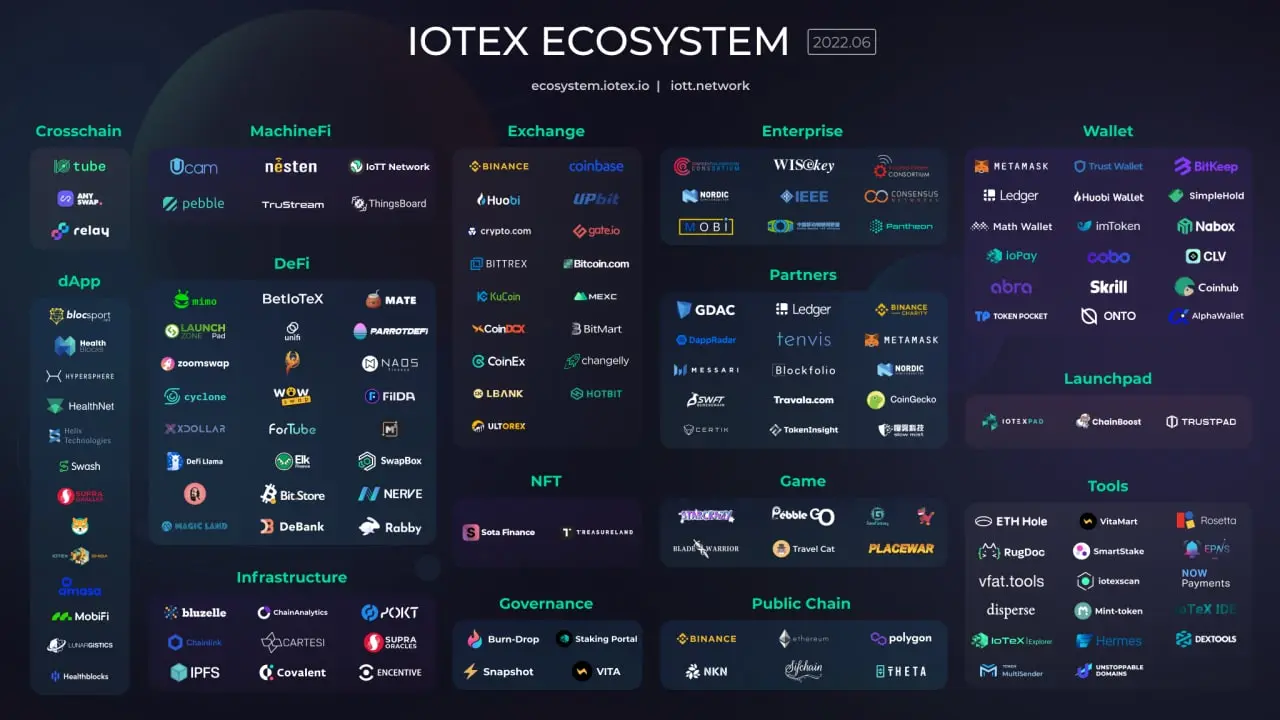What Is IoTeX? A Beginner's Guide

Presently, Web3 has a communication problem not only regarding the legacy Web but even the real world. IoTeX Network intends to become the bridge that would connect the real and digital world. What are IoTeX, MachineFi and how are these already used today? Dive right in and read our IoTeX beginner’s guide.
Key Takeaways
- IoTex is a blockchain-based Internet of Things network, focused on the decentralization of this technology and protecting the privacy of users;
- The IoTeX platform also supports decentralized applications, and to use them, there is a native cryptocurrency called IOTX. Present use cases for the IoTeX platform cover Web3 infrastructure, including DeFi, NFT, DAOs, metaverse, and MachineFi applications;
- MachineFi, a machine economy can be used to create IoT instances with functional value. At the same time, hundreds of thousands of IoTeX users avail services across 160+ dApps in the IoTeX ecosystem.
IoTeX Blockchain Network and How It Works
The Internet of Things is an emerging technology stack that powers smart homes and small interconnected systems of devices. However, this field is already not without its problems.
- IoT systems have a scalability problem as more and more clusters of interconnected devices appear;
- Different clusters in a centralized network have a privacy problem;
- Operating such a centralized network is costly;
- The functional value of IoT clusters right now is very limited.

/>
Source: IoTeX
IoTeX was developed as a solution to all those problems. It is a decentralized network to serve as a foundation for “machine economics”: anything from smart homes to autonomous vehicles. For each hurdle to IoT adoption, the IoTeX network offers a feature to address it:
- Blockchain-within-a-blockchain architecture;
- True privacy with RingCT;
- Quick consensus mechanism based on Delegated Proof-of-Stake called Roll-DPoS;
- Flexible and lightweight architecture which does not require nodes to store entire copies of the blockchain.
Blockchain-In-A-Blockchain

/>
Source: CoinBureau
How does IoTeX effectively scales for potentially billions of devices? Simply put, IoTeX uses a separate chain for each individual instance. The root chain secures the whole network and subchains (the two have a parent-child chain relationship) are reserved for individual IoT clusters.
Privacy
A smart home does not need to connect to other clusters all the time, and even then, it does not need to disclose all the data to the root chain. IoTeX uses ring signatures to sign transactions without needing to disclose the sender’s address.
Roll-DPoS
The specification of Delegated Proof-of-Stake that the IoTeX network uses is called Roll-DPoS: it includes randomization to determine block producers. Since all verification is determined at random, the network is maintained in a decentralized manner.
IoTeX-Powered Smart Devices
As of now, the IoTeX blockchain powers a couple of hardware smart device types. One of them is the real-world oracle Pebble which can track real-world data such as location, humidity, and light. The other is Ucam, a smart home security camera.
History and the Team
The development and research of IoTeX started in 2017. A team of over 40 scientists and engineers with backgrounds in Google, Facebook, Uber, Bosch, and Intel, has been building IoTeX from scratch for over two years.
To raise funds, IoTeX was initially sold on a private token sale in February 2018 as an ERC-20 token for $0.007 each. The launch of the IoTeX blockchain occurred in April 2019 and at launch, the Ethereum tokens were converted to IOTX coins.
At the helm of the team are Raullen Chai, Qevan Guo, and Jing Sun. Co-founder Raullen Chai is a University of Waterloo researcher in cryptography. His track record includes leading crypto R&D and engineering security at Uber and working as a security engineer at Google. Another co-founder Qevan Guo used to be a research scientist in machine learning and engineering manager at Facebook. Business expertise was brought by Jung Sun, the third co-founder. She works as a managing partner at Sparkland Capital.
Since then, IoTeX has grown rapidly. A few figures: it secures ∼$1B in assets on-chain, is used by >300K on-chain users, and >10k devices are connected across 165+ dApps.
What is IOTX Coin?
To tackle the lack of functional value in IoT, IoTeX uses a native token IOTX. The main applications for IOTX are gas fees and value transfer over the root chain.
What is IoTex doing with the functional value provided by a native token? IOTX uses an unconventional model of issuance and deflation called Burn-Drop. For every new device onboarded to the IoTeX network, 12,500 IOTX tokens are burned (at the time of writing). Drop refers to rewards that stakers receive for each new device registered, and right now the pool gains 6,250 IOTX extra.
The incentives are obvious: while long-term stakers receive rewards, the total supply decreases. Moreover, this also provides clear incentives for bringing new users to the network.
Use cases for IOTX Token
As a gas token, IOTX is needed to pay transfer fees on the IoTeX blockchain. That includes transfers of XRC-20 tokens such as USDT and BUSD and XRC-721 NFTs. Why would you want to transfer value over IoTeX? Because the ecosystem has dozens of applications including use cases like decentralized identity services, confidential computing, and others.

/>
Source: IoTeX
Secure hardware middleware has also been built on IoTeX to enable self-sovereign devices such as real-world oracle Pebble. The Pebble tracker has spurred the release of dApps on the IoTeX network that utilize real-world data. Notable apps built with it include the Proof-of-Presence protocol and Meta-Pebble. The former is actually a digital identity service for Web3 and metaverse, and the latter helps users monetize their geolocation data.
Comparison with Similar Projects
IoTeX vs IOTA
When speaking about “decentralized IoT”, IOTA also comes to mind. Unlike IoTeX, which uses blockchain technology, IOTA utilizes Directed Acyclic Graph. Directed acyclic graph, or DAG, is also a type of decentralized network which is nonlinear. So what is IoTeX’s edge over it? While DAG is faster than a layer-one blockchain, the capabilities of scaling on DAG are very limited.
IoTeX vs Secret Network
While most privacy coins use Proof-of-Work algorithms, it does not mean PoS privacy coins do not exist. One of the projects that is also focused on data privacy while running on PoS is Secret Network. IoTeX was built from scratch while Secret Network uses Tendermint as a basis. This enables Secret to connect to similar networks such as Cosmos.
Partnerships and Future

/>
Source: IoTeX Blog
At the time of writing, the IoTeX ecosystem includes over native 160 dApps and powers thousands of devices worldwide. There are a few particularly impressive IoTeX ecosystem apps:
- A Web3 health app HealthBlocks. It rewards users for a healthy lifestyle and lets them access relevant services without compromising their personal data;
- Ahoy connects the marine industry with Web3 and applies it in rental, tracking, management, security, and maintenance;
- A vehicle maintenance tracking service ROADRUNNR not only helps track the state of private transportation but also aims to reduce its environmental impact.
After a rebrand to a MachineFi company, IoTeX aims for the metaverse and even more smart devices. The anticipation of the MachineFi era of IoTeX announced a year ago drove the price up 200%. In June 2022, MachineFi Lab secured $10 million in funding for expansion and Web3 use cases: development, hiring, and potentially the incubation of early-stage projects on the platform.
What Wallet to Use for IoTeX?
Before you start using IoTeX, make sure you have a suitable crypto wallet for it. There is an official wallet for smartphones and desktop platforms that supports all the features of IoTeX. In case you need an offline wallet to securely store IOTX, we can recommend Trezor. In its companion app, you can swap the assets with ChangeHero without leaving it.
How to Buy and Exchange IOTX on ChangeHero?
If you want to exchange your crypto to IOTX and need a refresher on how exchanging with ChangeHero works, we’re here to help:
- Choose the currencies on the home page, amounts, and the type of exchange. Provide your IOTX wallet address in the next step and check the amounts;
- Double-check the provided information, read and accept the Terms of Use and Privacy Policy;
- Send in a single transaction the sum of the cryptocurrency you will be exchanging. In Fixed Rate transaction you have 15 minutes before it expires;
- Sit back and relax. At this step we are doing all the work: checking the incoming transaction and doing the exchange as soon as it arrives;
- As soon as the exchange has been processed, your IOTX is on its way to your wallet. And so, the transaction is finished!
If you ever run into any issues during your swap, our support specialists are always available to help you out in the chat or through the email: support@changehero.io.
Conclusion
The Internet of Things, as of now, is severely centralized and vulnerable to hacking. IoTeX was built as a solution to keep personal information secure without compromising. Over the years, it grew to encompass more use cases, such as machine economies, Web3, and the metaverse.
If you enjoyed this beginner’s guide, check out our blog for more. Follow ChangHero on Twitter, Facebook, and Telegram for daily updates and more content.
Frequently Asked Questions
What is IoTeX used for?
IoTeX is a blockchain-based Internet of Things platform that supports smart home devices and real-world oracles. Its real-world use cases are represented by Ucam and Pebble IoT devices. In addition, the platform supports a whole ecosystem of diverse dApps for various industries and spheres of life.
Is IoTeX built on Ethereum?
IOTX token was initially sold on a private sale in February 2018 as an ERC-20 token. At launch in April 2019, the Ethereum tokens were converted to mainnet IOTX coins.
Who created IoTeX?
oTeX was founded by computer scientist Raullen Chai, engineer Qevan Guo, and entrepreneur Jing Sun.
How many IOTX coins are there?
At the moment of writing, the circulating supply is 9,540,779,324.31 IOTX according to Messari. There is no hard cap on the total supply of IOTX coins since the ecosystem is expected to grow on a global scale.





